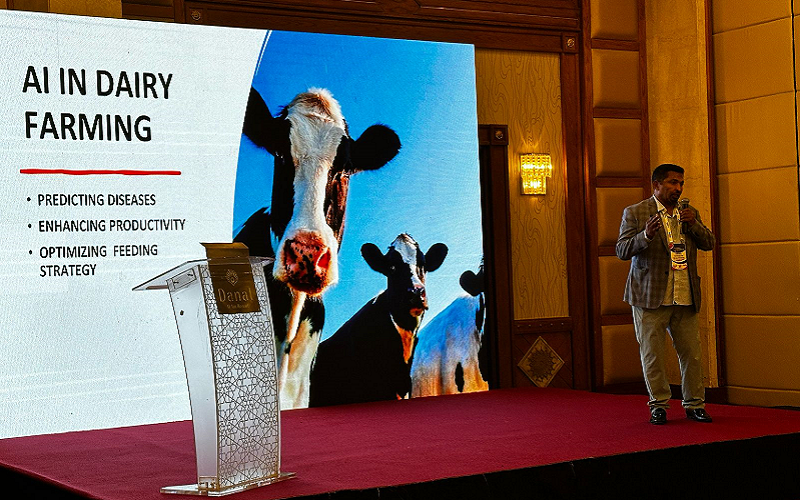Artificial Intelligence is Transforming Dairy Farming: Al Rawabi’s Smart Farm Strategy
At the 2025 Dairy Olympics, Ahmed Eltigani Elmansouri, CEO of UAE-based Al Rawabi Dairy, presented a strategic vision for a "smart farm" based on the integration of artificial intelligence, process automation, and big data analytics. According to Elmansouri, the industry has entered an era where AI is not just a supportive tool, but a core foundation for decision-making — from herd management to improving fertility and optimizing costs.

Dr. Elmansouri noted that humanity has evolved from the Stone Age to the digital and information era, and since 2022, has stepped into the age of artificial intelligence. The dairy industry, he said, must embrace this transformation. “AI helps reduce costs, detect diseases at an early stage, improve productivity, and enhance precision in farm management. Rejecting technology is the same as rejecting competitiveness,” he stated.
He identified three major elements of AI in agriculture: machine learning for analyzing large datasets, including herd genetics and insemination history; natural language processing (NLP) to power recommendation and analysis systems; and robotics for automating tasks such as milking, feeding, cleaning, and managing barn climate. Al Rawabi already manages more than 20,000 heads of cattle and is actively applying AI in its daily operations.
AI is changing herd management in several key ways. Fertility prediction becomes more accurate by analyzing physiological data like movement, rumination, and temperature to determine the best insemination timing. Farms using AI can shorten calving intervals, leading to increased productivity. Genetic analysis allows for the selection of the most promising animals using predictive models. Health monitoring enables early detection of diseases such as mastitis, acidosis, and ketosis—often before any symptoms appear—thus reducing treatment costs.
Elmansouri also presented a five-year roadmap for AI integration. In years one and two, the focus is on collecting and structuring data, as well as incorporating AI into the reproductive cycle. In years three and four, farms move toward full automation, including milking, feeding, and climate control. By year five, the strategy includes using biogas plants, AI-driven climate impact analysis, and smart barns featuring blockchain elements.
Al Rawabi is also prioritizing energy independence and environmental sustainability. The company uses biogas systems that convert manure into heat and electricity. AI helps manage heat stress in animals and adapt their diet, resulting in increased milk yields and better overall welfare.
Despite the rise in automation, Dr. Elmansouri highlighted the importance of engaging young people in agriculture. “Today, farming is becoming a business. Young people bring digital thinking — and they are the drivers of AI adoption,” he said.
He identified three major elements of AI in agriculture: machine learning for analyzing large datasets, including herd genetics and insemination history; natural language processing (NLP) to power recommendation and analysis systems; and robotics for automating tasks such as milking, feeding, cleaning, and managing barn climate. Al Rawabi already manages more than 20,000 heads of cattle and is actively applying AI in its daily operations.
AI is changing herd management in several key ways. Fertility prediction becomes more accurate by analyzing physiological data like movement, rumination, and temperature to determine the best insemination timing. Farms using AI can shorten calving intervals, leading to increased productivity. Genetic analysis allows for the selection of the most promising animals using predictive models. Health monitoring enables early detection of diseases such as mastitis, acidosis, and ketosis—often before any symptoms appear—thus reducing treatment costs.
Elmansouri also presented a five-year roadmap for AI integration. In years one and two, the focus is on collecting and structuring data, as well as incorporating AI into the reproductive cycle. In years three and four, farms move toward full automation, including milking, feeding, and climate control. By year five, the strategy includes using biogas plants, AI-driven climate impact analysis, and smart barns featuring blockchain elements.
Al Rawabi is also prioritizing energy independence and environmental sustainability. The company uses biogas systems that convert manure into heat and electricity. AI helps manage heat stress in animals and adapt their diet, resulting in increased milk yields and better overall welfare.
Despite the rise in automation, Dr. Elmansouri highlighted the importance of engaging young people in agriculture. “Today, farming is becoming a business. Young people bring digital thinking — and they are the drivers of AI adoption,” he said.
Gold Partners
- Al Ain Farms Group
- Imperial
Innovation Partners
Partners
- France Group
- ifcm.com.tr/">IFCM
Key News of the Week











